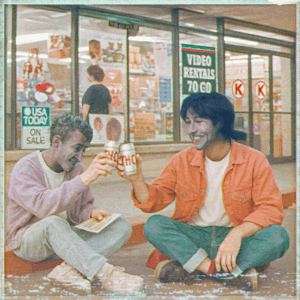GreenPharms pioneered Arizona’s first bodega style dispensary, setting a new standard for immersive, customer-driven cannabis retail.
An arms race is underway in Arizona’s cannabis retail scene. Legacy counter-service models are yielding to immersive formats that borrow cues from supermarkets and delicatessens. The hybrid approach—equal parts grab-and-go and sensory boutique—isn’t just clever branding. It’s a data-driven bid to lift basket sizes, convert the canna-curious and future-proof stores against an increasingly crowded market.
The Rise of the Bodega-Style Dispensary
The bodega blueprint first migrated from New York’s corner stores to the Southwest last fall when GreenPharms relaunched its Mesa location as GP Mart. Shoppers push carts past open shelving, eye-level endcaps and refrigerator cases stocked with edibles, an echo of the familiar grocery run. The goal: normalize cannabis retail by framing it as another household errand.
GP Mart’s floor plan funnels guests through well-marked aisles for flower, concentrates, vapes and accessories. Way-finding placards translate THC ratios, terpene profiles and dosage guidance into plain language—an evidence-based nudge that boosts label literacy and shrinks dwell time at the register.
Research across mainstream retail shows orderly, eye-level placement can raise impulse buys by up to 34 percent, and GreenPharms’ merchandising team leans on that psychology.
Self-serve digital kiosks and QR codes unlock batch reports, terpene maps and video explainers. Roving advisers fill in the gaps, mirroring the consultative style of Apple’s Genius Bar. The net effect is agency: shoppers can glide solo or request white-glove service without ever feeling rushed.
Open shelving has long been correlated with higher unplanned spend in grocery channels. Early metrics from GP Mart show a double-digit lift in average order value compared with the chain’s legacy counter model, plus a halo effect on e-commerce orders placed after in-store discovery.
An open-floor plan demands tight inventory controls. GreenPharms retrained staff to be veritable “floor pharmacists” who patrol aisles, aid customers and discreetly watch for shrinkage. Loss-prevention cameras and RFID-tagged bins add another layer of accountability.
Placing salty snacks beside infused gummies nudges micro-dose shoppers toward traditional munchies—a tactic borrowed from convenience retail that quietly spikes ancillary revenue.
The Deli-Style Shopping Experience
Arizona allows on-site weighing and repackaging as long as product traceability and hygiene protocols are met—a flexibility unavailable in tightly pre-packaged states such as California and New York.
GP Mart’s deli counter showcases climate-controlled jars, scratch-and-sniff aroma cards and staff-guided sniff sessions. By staging flower like produce, the store taps powerful olfactory memory while mitigating contamination risk.
Consumers routinely pay premiums for see-smell-select access. GreenPharms tiers its deli flower—craft, reserve, bulk—and bundles grams with house-brand papers to sweeten the price ladder.
Budtenders glove up, rotate jars, log batch times and sanitize scoops per Arizona’s food-code standards. Terpene volatility is tracked via daily humidity checks; jars retire to back-of-house storage once aroma degrades.
In deli-forward stores nationwide, flower can reach 65 percent of revenue. GP Mart’s hybrid format leverages that margin engine while cross-selling vapes and edibles from adjacent aisles.
Heat-mapping software monitors shopper flow and flags dead zones for planogram tweaks. AR “scent simulators” are in pilot, letting guests preview terpene blends without opening a jar. Back-end predictive inventory links in-store scans with online wish lists to forecast re-orders, keeping shelves flush with top-moving SKUs.
Color-coded icons demystify potency, flavor and origin, reinforcing trust and speeding navigation. Story cards spotlight Arizona cultivars, turning commodity flower into local lore. The loyalty platform—gamified with points for attending terpene workshops—encourages repeat missions and primes the customer data loop.
A potential federal rescheduling could relax current sampling limits, clearing the way for expanded aroma stations. Meanwhile, circular packaging pilots—think reusable glass jars with deposit returns—are gaining traction as retailers chase eco-minded Gen Z customers.
Check Out Our Daily Deals
Whether you’re a budget shopper or a high-tolerance connoisseur, there’s something on sale every day at GP Mart. Our daily deals rotate frequently and include some of the biggest brands in the state, as well as exclusive in-house specials you won’t find anywhere else. Come in, check the board, and leave with more than you expected—every time.

***
GreenPharms is more than just a dispensary. We are a family-owned and operated company that cultivates, processes, and sells high-quality cannabis products in Arizona. Whether you are looking for medical or recreational marijuana, we have something for everyone. From flower, edibles, concentrates, and topicals, to accessories, apparel, and education, we offer a wide range of marijuana strains, products and services to suit your needs and preferences. Our friendly and knowledgeable staff are always ready to assist you and answer any questions you may have. Visit our dispensaries in Mesa and Flagstaff, or shop online and get your order delivered to your door. At GreenPharms, we are cultivating a different kind of care.
Follow us on social media





